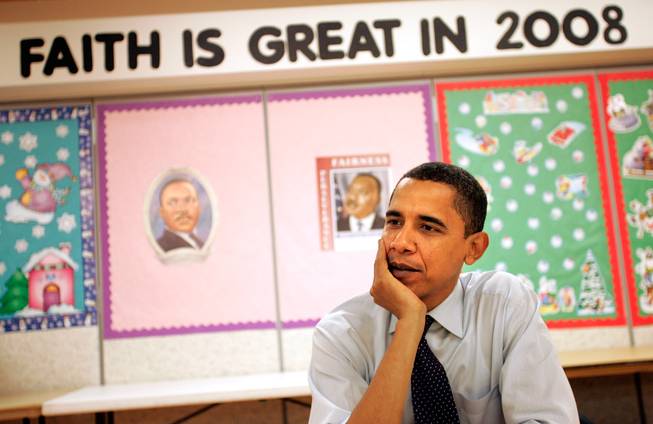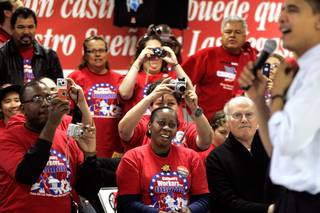
Democratic presidential hopeful Sen. Barack Obama speaks during an interview on Sunday at Doolittle Community Center.
Monday, Jan. 14, 2008 | 2 a.m.
Caucus Coverage
- Slideshow: The Obama campaign in Vegas
- Blog: Actor wired in to Obama camp (1-13-07)
- Obama Bio
- Obama on the Issues
- Caucus Guide
In a Sun interview Sunday, Illinois Sen. Barack Obama addressed the suddenly front-and-center issue of race in his fight with New York Sen. Hillary Clinton for the Democratic presidential nomination.
Looking poised and relatively fresh given the grueling schedule of a presidential campaign, the senator from Illinois spoke in his customary manner — cool, measured, deliberate — about urban issues, his appeal to Hispanic voters and a controversial lawsuit about Saturday’s caucus that is pitting some Clinton backers against Obama and the union that endorsed him last week, Culinary Union Local 226.
Audio Clip
- Obama on the Culinary lawsuit
-
Audio Clip
- Obama on racial overtones
-
Audio Clip
- Obama on "The Wire's" Omar
-
Also, the TV show “The Wire” came up.
Obama, framed by a portrait of the Rev. Martin Luther King Jr. in a Doolittle Community Center classroom, addressed the lawsuit in which a group of Democratic activists, including the state teachers union, is suing the Democratic Party, declaring as unfair the existence of nine at-large caucus sites on the Strip. Those sites are designed to allow shift workers union and nonunion to caucus in case the 11:30 a.m. start time falls during their workday. The plaintiffs say the Strip caucus sites are designed to give an unfair advantage to the Culinary.
Obama addressed the lawsuit head-on: “Look, the caucus structure was agreed to by every major player in the Democratic Party here in Nevada and was negotiated by the major players in the Democratic National Committee. Six days before the caucus is taking place, some of the people who were connected to setting up this very structure are now filing suit, trying to change the rules. It’s hard not to draw the conclusion that people were unhappy about the outcome of the Culinary Union endorsement process and now people are trying to fix it. In the process it is disenfranchising dishwashers and bartenders who work hard and should be able to participate in their democracy.”
Although Obama didn’t mention it, his surrogates, including Culinary Secretary-Treasurer D. Taylor and state Sen. Steven Horsford, D-North Las Vegas, are quick to point out that many of those who would be “disenfranchised” are black or Hispanic.
For black voters especially, the issue of disenfranchisement is not to be trifled with, considering America’s Jim Crow past and the history of willful suppression of the black vote.
Indeed, race has become a sudden and unavoidable fact of the presidential contest as it moves to the first state with a sizable minority population.
In recent weeks, Clinton allies have made a series of awkward and sometimes crass remarks that play to stereotypes about black men.
Billy Shaheen, her then-New Hampshire chairman, speaking about Obama’s admission in his memoir that he used drugs as a teenager, said Obama would have to answer questions about whether he’d sold drugs. Shaheen resigned.
Andrew Cuomo, a Clinton supporter and New York’s attorney general, said about New Hampshire, “You can’t shuck and jive” there.
Robert Johnson, founder of Black Entertainment Television, seemed to imply that while Clinton and her husband, Bill Clinton, were working hard for black people, Obama was off doing drugs. Johnson later released a statement denying that that’s what he meant.
Clinton recently seemed to downplay the role of the Rev. Martin Luther King Jr. in the passage of the Civil Rights Act.
“Dr. King’s dream began to be realized when President Lyndon Johnson passed the Civil Rights Act of 1964, when he was able to get through Congress something that President Kennedy was hopeful to do, the president before had not even tried. But it took a president to get it done.”
This series of events, which the Clinton camp says are discrete and easily explained, carries considerable risk of a backlash for her. Black voters could make up to 20 percent of Democratic caucusgoers in Nevada. White Democrats might react angrily to any impression that the Clinton campaign hascoordinated an effort to use race against Obama.
On the news show “Meet the Press,” Clinton accused the Obama campaign of distorting what she said about King: “Clearly, we know from media reports that the Obama campaign is deliberately distorting this ... It is such an unfair and unwarranted attempt to, you know, misinterpret and mischaracterize what I’ve said.”
Asked by the Sun about the racial tenor of the race, Obama replied: “I am puzzled by it. She made a statement about Dr. King that I think was ill-advised. But I said nothing about it. Suddenly, she is blaming us for distorting her words. I don’t know how I could distort her words since I hadn’t commented on her words since she made the statement. Now you see this ratcheting up of rhetoric coming out of her surrogates. I find it puzzling.”
Asked whether Hispanics, who make up one-quarter of Nevada’s population, would support a black candidate for president, he deflected the question and said they probably know the Clintons better than they know him. He then laid out a list of policy proposals designed to help Hispanics, including immigration changes that would provide a path to citizenship for illegal immigrants, school dropout prevention programs and money for college.
“If Latino voters examine my track record, I think they’ll feel enormous confidence that I will be strong advocate on behalf of equal opportunity and fairness.”
If the recent Culinary endorsement is to mean anything, Obama will have to appeal to Hispanics, who make up 40 percent of the union’s membership.
He also discussed his agenda for healthier cities, which includes early childhood education, job creation and drug treatment, all aimed at breaking a cycle of poor people with few opportunities going into the drug trade, which leads to prison, making them almost permanently unemployable.
Michael Kostroff, an actor who was in town to volunteer for Obama and had a chance to meet him, told the Sun that Obama’s favorite TV show is his own: HBO’s “The Wire,” which chronicles Baltimore’s violent drug culture and the police who quixotically try to stop it.
Obama told the Sun his favorite character is Omar, a stick-up artist who steals from drug dealers and then gives the loot to poor people in the neighborhood.
“That’s not an endorsement. He’s not my favorite person, but he’s a fascinating character.”


Join the Discussion:
Check this out for a full explanation of our conversion to the LiveFyre commenting system and instructions on how to sign up for an account.
Full comments policy